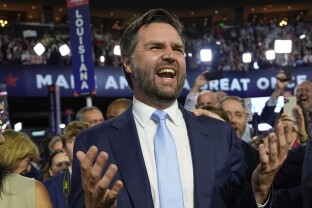Former President Donald Trump has made his decision on a running mate: J.D. Vance.
“After lengthy deliberation and thought, and considering the tremendous talents of many others, I have decided that the person best suited to assume the position of Vice President of the United States is Senator J.D. Vance,” Trump posted on Truth Social Monday.
The announcement received an enthusiastic reception on the Republican National Convention floor, where the Ohio delegation gave a standing ovation and chanted “J.D.” after Sen. Mike Lee mentioned Vance.
